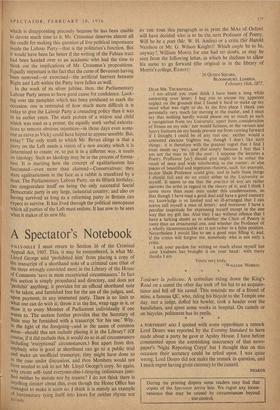A Spectator's Notebook
WILLY-NILLY I must return to Section 16 of the Criminal Appeal Act, 1907. This, it may be remembered, is what Mr. Lloyd George said 'prohibited him' from placing, a copy of the transcript of a shorthand note of a criminal case (that of the three wrongly convicted men) in the Library of the House of Commons 'save in most exceptional circumstances.' In fact this section is simply procedural and directory, and does not `Prohibit' anything; it provides for an official shorthand note to be taken, and furnished free for the use of the judges, and, upon payment, to any interested party. There is no limit to What one can do with it; throw it in the fire, wrap eggs in it, or show it to every Member of Parliament individually if one Wants to. The section further provides that the Secretary of State may be furnished with a transcript 'for his use.' Why, in the light of the foregoing—rand in the name of common sense—should this not include placing it in the Library? (Of course, if it did exclude this, it would do so in all circumstances including 'exceptional' circumstances.) But apart from this. illybody who is good at shorthand can go to a public trial and make an unofficial transcript; they might have done so in the case under discussion, and then Members would not have needed to ask to see Mr. Lloyd George's copy. So again, Why create self- (and everyone-else-) denying ordinances justi- fied neither by statute nor by reason? I do not think there is anything sinister about this, even though the Home Office has managed to make it seem so. I think it is merely an example of bureaucracy tying itself into knots for neither rhyme nor rc:.son. BY THE TIME this paragraph is in print the MAs of Oxford will have decided who is to be the next Professor of Poetry. Will he be a poet (Mr. W. H. Auden) or a critic (Sir Harold Nicolson or Mr. G. Wilson Knight)? Which ought he to be, anyway?, William Morris for one had no doubt, as may be seen from the following letter, in which he declines to allow his name to go forward (the original is in the library of Morris's college, Exeter): 26 QUEEN SQUARE,
BLOOMSBURY, LONDON. February 16111,1877. DEAR MR. THURSFIELD.
I am. afraid you must think I have been a long while answering your letter; I beg you to excuse my apparent neglect on the grounds that I found it hard to make up my mind what was right to do. In the first place I thank you personally very much for moving in the matter, and I must say that nothing hardly would please me so much as such a recognition from my University, apart from consideration Of fitness on my side: nor would laziness, or the various and heavy business on my hands prevent me from coming forward if I thought I could be of any real use: neither would a contested election frighten me, though I don't like such things: it is therefore with the greatest regret that I find I must needs say 'no'; and this simply because I feel that I am not the man to fill the post : I suppose the lectures a Poetry Proffessor [sick should give ought to be either the result of deep and wide scholarship in the matter:. or else pieces of beautiful and ingenious rhetoric, such, for example, as.our Slade Professor could give; and in both these things I should fail and do no credit either to the University or myself. It seems to me that the practice of any art rather narrows the artist in regard to the theory of it; and 1 think 1 come more than most men under this condemnation, so that though I have read a good deal and have a good memory my knowledge is so limited and so ill-arranged that I can scarce call myself a man of letters: and moreover I have a peculiar inaptitude for expressing myself except in the one way that my gift lies. Also'may I say without offence that I have a lurking doubt as to whether the Chair of Poetry is more than an ornamental one, and whether the Professor of a wholly incommunicable art is not rather in a• false position. Nevertheless I would like to see a good man filling it, and, if the critics will forgive me, somebody who is not only a critic.
1 ask your pardon for writing so much about myself but your kindness has brought it on your head: with many thanks I am
Yours very truly,
• WILLIAM MORRIS.


































 Previous page
Previous page